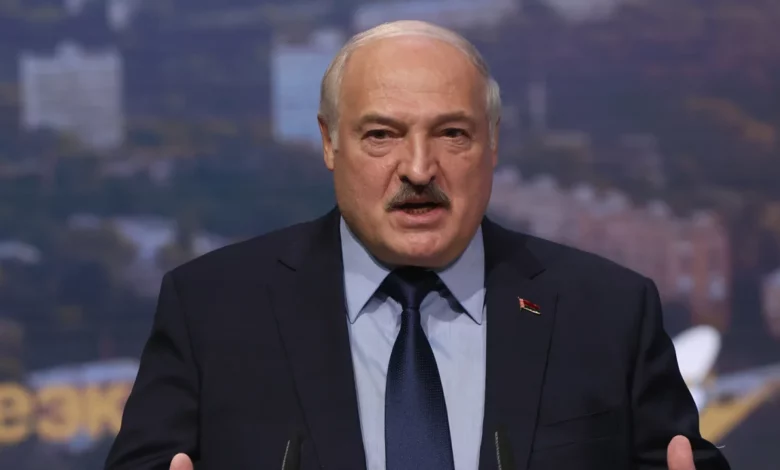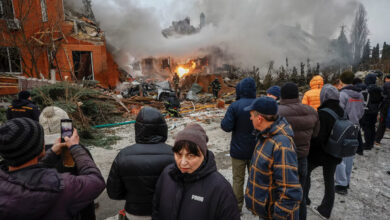
Lukashenko, a close ally of Russian President Vladimir Putin, made the comments in an on-camera interview released Sunday on the state-run Russia 1 channel.
During the interview, Lukashenko said, “no one minds Kazakhstan and other countries having the same close relations that we have with the Russian Federation.”
“It’s very simple,” he added. “Join the Union State of Belarus and Russia. That’s all: there will be nuclear weapons for everyone.”
Signed in 1999, the Agreement on Establishment of the Union State of Belarus and Russia Treaty set up a legal basis for a wide-ranging alliance that spanned economic, information, technology, agriculture, and border security among other things between the two countries, according to the Belarus government website.
It was not clear how wide Lukashenko’s invitation to join the Union State extended, and he offered no other specifics.
But his comments on handing out nuclear weapons to like-minded allies are likely to heighten concerns at a time of growing global proliferation and as Moscow threatens the world with its own atomic arsenal as its war against Ukraine falters.
On Thursday the Belarusian autocrat said the transfer of some tactical nuclear weapons from Russia to Belarus had begun, following an agreement signed by Moscow and Minsk.
“It was necessary to prepare storage sites, and so on. We did all this. Therefore, the movement of nuclear weapons began,” Lukashenko said, according to state news agency Belta.
He also promised the safety of those weapons, saying: “This is not even up for discussion. Don’t worry about nuclear weapons. We are responsible for this. These are serious issues. Everything will be alright here.”
Putin has said that Russia would retain control over any tactical nuclear weapons stationed in Belarus and likened the move to Washington’s practice of stationing nuclear weapons in Europe to keep host countries, like Germany, from breaking their commitments as non-nuclear powers.
Belarus has had no nuclear weapons on its territory since the early 1990s. Shortly after gaining independence following the collapse of the Soviet Union, it agreed to transfer all Soviet-era weapons of mass destruction stationed there to Russia.
Since invading Ukraine more than a year ago, Putin has used escalating rhetoric on a number of occasions, warning of the “increasing” threat of nuclear war and suggesting Moscow may abandon its “no first use” policy.
In March, Putin said Moscow will complete the construction of a special storage facility for tactical nuclear weapons in Belarus by the beginning of July, and said Russia had already made the transfer to Belarus of an Iskander short-range missile system, which can be fitted with nuclear or conventional warheads.
Tactical nuclear weapons are smaller than strategic nuclear weapons – which can decimate entire cities – and are designed for use in a limited battlefield. However, their explosive yields are still enough to cause major destruction as well as radiation contamination.
Strong condemnations
The United States and the European Union, as well as opposition leaders in Belarus, have denounced the move to deploy Russian tactical nuclear weapons in Belarus.
“It’s the latest example of irresponsible behavior that we have seen from Russia since its full-scale invasion of Ukraine over a year ago,” said US State Department spokesperson Matthew Miller on Thursday.
Miller added that despite the report of the transfer, the US sees “no reason to adjust our strategic nuclear posture” and said there are no “indications that Russia is preparing to use a nuclear weapon.”
The EU called the agreement between Moscow and Minsk “a step which will lead to further extremely dangerous escalation.”
And Ukrainian presidential adviser Mykhailo Podolyak tweeted on Sunday that Lukashenko’s words “directly indicate that the Russian Federation is deliberately ‘killing’ the concept of global nuclear deterrence and ‘burying’ the key Global Treaty on the Non-Proliferation of Nuclear Weapons.”
“This fundamentally undermines the principles of global security,” Podolyak said. “There can only be one solution: a tough stance of nuclear states; relevant UN/IAEA resolutions; extensive sanctions against (Russian state nuclear energy firm) Rosatom; systemic financial sanctions against Belarus and ultimately against Russia.”
Members of the Belarusian opposition also slammed the agreement, with exiled opposition leader Sviatlana Tsikhanouskaya saying in a post on Twitter “we must do everything to prevent Putin’s plan to deploy nuclear weapons in Belarus.”
“It directly violates our constitutional non-nuclear status and would secure Russia’s control over Belarus for years ahead. And it would further threaten the security of Ukraine and all of Europe,” she said.
Analysts say there are still a lot of unknowns with the transfer.
“We don’t know if it’s actually physically started yet, though Lukashenko says it has. We don’t know if any weapons have actually left Russia yet, we don’t know when they are going to be deployed, we don’t know what kind of weapons will be deployed,” national security expert Joe Cirincione told CNN on Friday.
Cirincione, former president of the Ploughshares Fund which is focused on reducing the threat of nuclear weapons, said if it goes ahead it would be “an historic milestone.”
“We can’t remember another incident where, during a crisis, a nuclear armed state has flushed its weapons from garrison and put them into the field, which is effectively what Putin is doing here,” he said.
CNN’s Lauren Kent, Xiaofei Xu and Radina Gigova contributed reporting.




